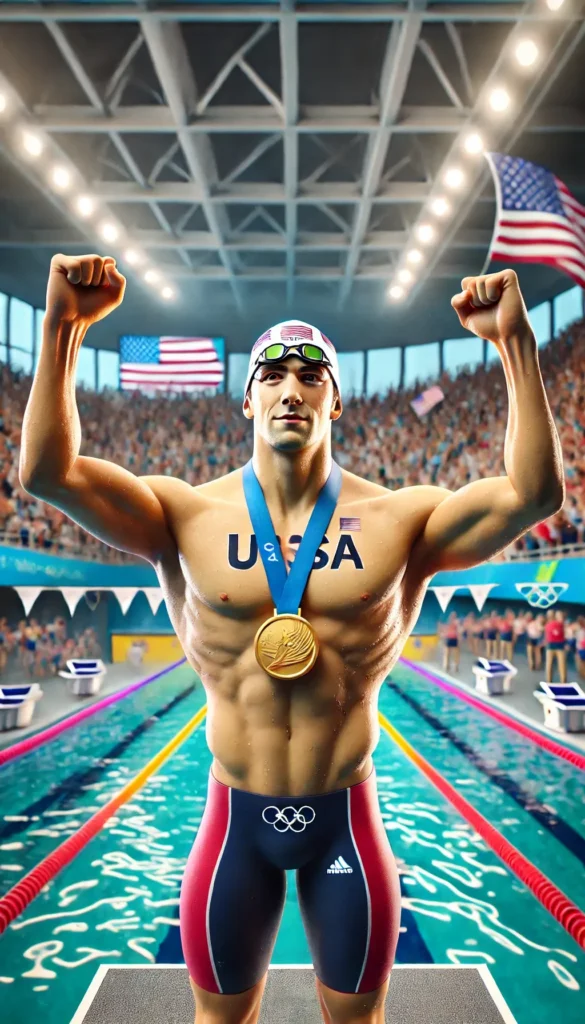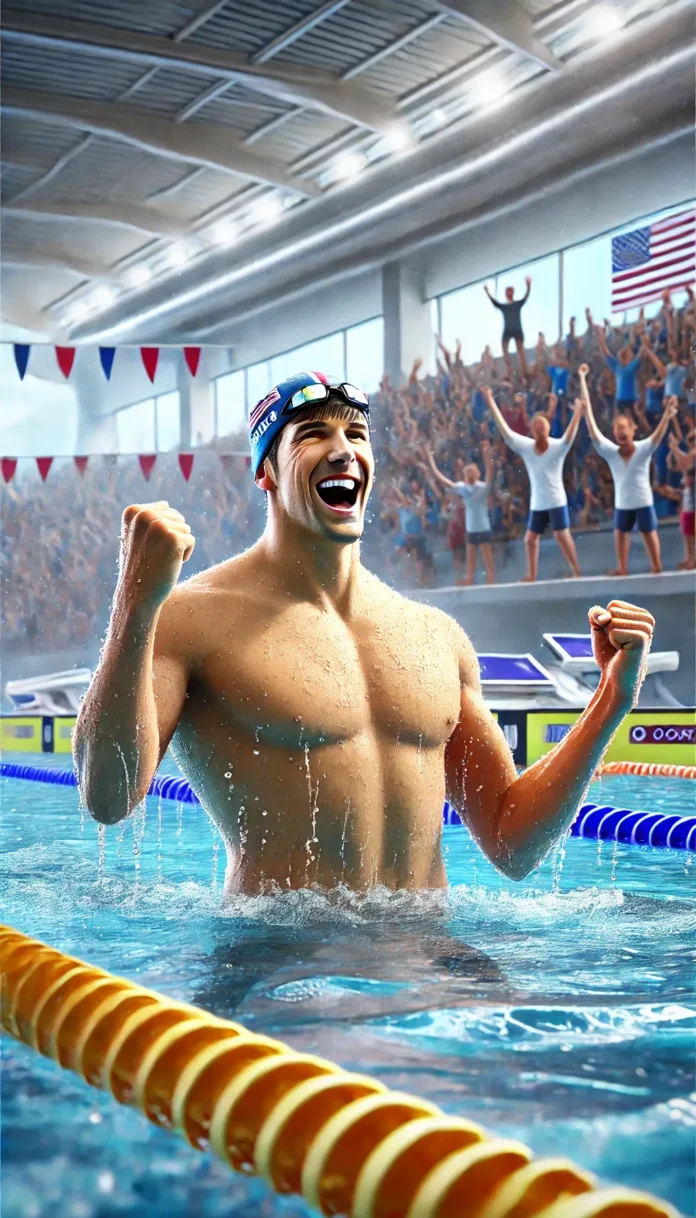Michael Phelps is not just any name in the annals of sporting history but is simultaneous with dominance, rising from the ashes, and relentless pursuit of greatness. With 28 Olympic medals to his name and a record of 23 of these gold medals, Phelps stands as the most decorated Olympian of all time. However, his legend goes way beyond the medals in count. The article focuses on his early life and rises to this aquatic legend’s career—from the boy, his diagnosis in early childhood, to the story of becoming the most dominant athlete the Olympics have ever seen. We take a closer look at record-smashing and iconic victories and some controversies in which he has been involved, which have undoubtedly made him a personality whose influence goes well beyond the pool.
From Energetic Boy to Aquatic Prodigy

A young Michael Phelps, possibly around 12-15, competes in a swimming race.
Born in Baltimore, Maryland, on 30th June 1985, Michael Phelps’ life took a different turn as a boy. Because he had ADHD, it became impossible for him to focus on something. Having assessed his enormous energy levels, his mother, Deborah, enrolled him for swimming lessons at North Baltimore Aquatic Club. It was under coach Bob Bowman’s watchful eyes that Phelps’s inherent talent began to emerge. His freakishly long wingspan of 14 feet and unrelenting drive provided the correct premise for future domination.
Early competitions revealed a prodigy in the making. Phelps shattered national age group records, and by age 15, he qualified for the 2000 Sydney Olympics—the youngest male swimmer on the US team in more than 68 years. Though he did not medal in Sydney, experience ignited the fire within. Phelps then dedicated himself to relentless training, testing his body and mind at new levels.
Meteor-like Rise into the Olympic Stage
The Athens Olympics 2004 served as the launch vehicle for Phelps’s meteoric rise. He exploded onto the international scene, astounding everyone by returning with a haul of six golds and two bronzes, which not only tagged Phelps as a powerhouse swimmer but nearly equalled Mark Spitz’s seven gold medal total in a single Olympics.
It was at the Beijing 2008 Games that Phelps really did put his name indelibly into sporting history. The unprecedented eight golds made him victorious in all his events. But the sheer brilliance of this performance lay in shattering world records, from the gruelling 400-meter individual medley to the explosive 100-meter butterfly, redefining Olympic dominance—Phelps ruled the pool with unmatched speed and stamina.
Well, the 2012 Olympics in London also brought the even greater challenge of competitors striving for the top place. He never lost his determination, anyway. Phelps won four gold and two silver medals to seal once and for all his place as the greatest Olympian of all time.
Rio 2016 was Phelps’s final Olympic hurrah. If carrying his country’s flag as the American team flag bearer didn’t give him a large enough target on his back, he also bore an immense weight of expectation. But pressure is the last thing that scares his competitive spirit. He added five more Olympic medals to his kitty, of which four were gold before he took a well-deserved retirement and left behind a legacy to inspire successive generations.
Legacy Defined by Records: Shattering Boundaries
It wasn’t in the medal count that Michael Phelps dominated the Olympics, but in the number of records he broke. He holds the record for the most Olympic gold medals won with 23, the most Olympic medals won overall with 28, and the most gold medals in individual events with 13. He has garnered 82 medals in major international long course competitions—65 gold, 14 silver, and three bronze—from the Olympics, World Championships, to the Pan Pacific Championships. It wasn’t just a splashing of his way to victory but one he collected like water droplets clinging to his suit. Acknowledgements poured over him like a celebratory downpour. He became an attraction for awards, a walking epitome of the relentless pursuit of excellence. Eight times in 2012 and 2016, he took away the World Swimmer of the Year Award. Astounding is that he led the American Swimmer of the Year category eleven times from 2001-2009, with a break in 2005. He even pulled the prestigious FINA Swimmer of the Year award to his side, recognising him in 2012 and 2016. His dominance at the 2008 Olympics was unprecedented, and he was subsequently awarded the coveted title of Sports Illustrated’s Sportsman of the Year. He also set many world records throughout his career, most of which have not been broken. There is no denying his influence on swimming—it has tested human potential and opened millions of aspiring athletes’ eyes.

Iconic Moments: Races Etched in Olympic History
Among the many conquests in Phelps’ Olympic career were genuinely iconic moments that mesmerised millions worldwide. One was the “Duel in the Pool” during the 2008 US versus combined British competition. Phelps demonstrated precisely what type of laser-like focus and grit it took to edge archrival Milor Cavic by a fingernail in an electrifying 200-meter freestyle race. Another memorable performance was during the 4×100-meter freestyle relay at the 2012 London Olympics—Phelps’s spectacular win en route to his 20th Olympic medal as anchor.
He also swam a then-personal-best time. Phelps, 15, finished fifth in the 200-meter butterfly, setting the stage perfectly for what was to come in the future. He became the youngest male to make the United States Olympic swim team since Ralph Flanagan in 1932, 68 years earlier.
These and many other moments made Phelps a legend in swimming and even in the entire Olympic movement.
Doping Shadows: Olympic Legends Challenge WADA
Swimming legends Michael Phelps and Allison Schmitt testified at a congressional hearing that criticised the World Anti-Doping Agency over its handling of a case involving 23 Chinese swimmers who allegedly tested positive for a banned substance yet competed in the Tokyo Olympics. The case raised again the issue of fairness in international sports and put new pressure on WADA to wade through murky waters in anti-doping enforcement.
Conquering Adversity: Out of the Doping Shadow
Michael Phelps’ path has not been devoid of blemishes. Legal mishaps arose from DUI charges in 2004 and 2014. These mishaps have raised questions over athletes’ behaviour and tarnished their image. However, Phelps acknowledged his mistakes, took full responsibility, and sought help. It was a period of growth when he came to show maturity and a learning capacity.
From Pool Star to Party Foul: Phelps Faces Public Outcry
Michael Phelps’ legacy is partially blemish-free. A photo surfaced online showing him smoking marijuana at a party. That created a media frenzy, damaging his image with serious repercussions: an essential cereal brand, Kellogg’s, ended sponsorship ties, and USA Swimming suspended him for three months. But Phelps showed remarkable resilience. He confessed to the mistake publicly, and out of that controversy, he emerged more of a man.
Leaving a Lasting Impact: A Life Beyond the Pool
Coming back with fire, re-igniting himself from retirement from competitive swimming, Michael Phelps went on to win the 100-meter fly at the 2014 Arena Grand Prix in Charlotte. The national team’s present stumbles, losing the title at the most prized 4x100m freestyle relay since their dominant runs in Beijing and Rome, were strong motivations.
By then, though, his long-time coach, Bob Bowman, had become strained after the 2012 London Olympics. Phelps laid it all bare to convince a sceptical Bowman, saying, “This wasn’t about chasing history, medals, or the cheers of the crowd. This time, it was about rediscovering the joy of swimming, for himself, and savouring the journey.”.
Phelps has moved on to a different life. He promotes water safety through the Michael Phelps Foundation by providing swim lessons to protect kids from drowning. This, in turn, shows his deep association with the game, which made him and his idea of giving back to society.
He has also been vocal about mental health awareness. He speaks of his struggles with ADHD and tries to shatter the taboo associated with it and speak out for help.
Apart from philanthropy, Phelps has become a father, and he relishes every moment spent with his wife and children.
The Lasting Legacy of Michael Phelps
Michael Phelps’s greatness is beyond the medals he won. He also raised the game of swimming and maximised the human body’s potential, leaving an entire generation of athletes in awe to work harder. His mental and physical bravery against all odds inspires one and all.
The Phelps story speaks loudly about hard work, commitment, and resilience. Michael Phelps is no less than a champion inside and outside the pool—and the legend of Michael Phelps will last till Olympic swimming exists—to enthuse generations of swimmers and athletes across the face of the earth.


